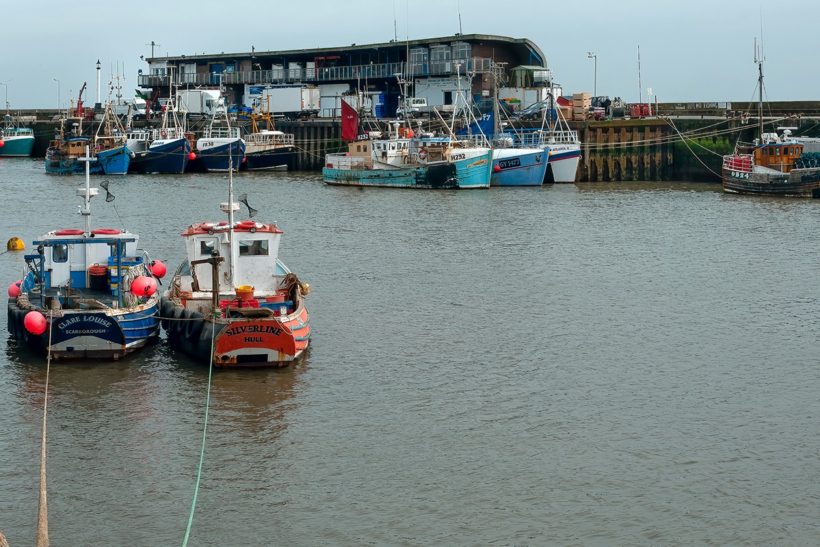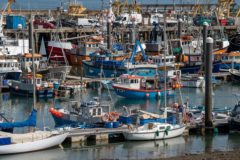Limit to apply to all vessels to comply with TCA
NUTFA is calling for all vessels working with mobile gear in the UK 6-12nm zone to be restricted in power and size, as a means to prevent powerful Dutch fly-draggers from fishing in the zone and protect UK inshore boats, reports Tim Oliver.
It says all vessels in the zone should be restricted to 221kW (297hp) and 24m in length, and that there is support for the proposal in Defra.
The restrictions could legally be implemented, because they would apply to all vessels, not just foreign boats. There is a precedent for such a restriction in the CFP’s technical regulations, which prevent European beam trawlers of this power and length from working inside the UK 12-mile limit.
NUTFA – and also French inshore fishermen – are deeply concerned about the impact of powerful, mainly Dutch-owned, fly-draggers on fish stocks, and the effects on the livelihoods of inshore fishermen in the Channel and North Sea.
In a letter to coastal MPs in England, asking for their support for the move, NUTFA director Jerry Percy says that following discussions with Defra and others and ‘consideration of a range of options, there is a general consensus that the most effective and straightforward approach to regulating this effort in a non-discriminatory way would be to introduce a restriction on engine power within the 6-12nm zone’.
He notes the precedent of restrictions on beam trawlers inside 12 miles, which were ‘clearly written in recognition of the environmental impact of the excess fishing power of these vessels’.
“It is our contention… that the UK could and should without delay introduce a simple and straightforward regulation based on the 221kW limit that would prevent any fishing vessel using mobile gears, to include fly-shooting, irrespective of length of vessel, from operating within the UK’s 12-mile limit,” he tells the MPs.
“A failure to do so will signal the demise of our coastal fleet.”
He says the ‘straightforward and easily enforceable’ regulation would ‘at a stroke remove this existential threat to our inshore waters, and to the smaller-scale fishermen who rely upon them’.
Because it would be non-discriminatory, the restriction would affect some more powerful UK vessels, but they are ‘more than capable of maintaining a good living outside of the 12-mile line’.
Removing such large-scale fishing effort from inshore waters would significantly and ‘very quickly’ benefit fish stocks and the wider marine environment, he says.
“We know that officials within Defra are in favour in principle of such an approach,” Jerry Percy tells MPs.
“We certainly know that our beleaguered inshore fishermen are desperately supportive of this way forward, and we know that the general public would support such an initiative.”
He says it is established that the government recognises the importance of protecting the 6-12nm zone from ‘the ravages of larger vessels’, as it supported exclusive access to this zone in the Brexit negotiations.
“Tragically, and for reasons that have never been made clear, they were unable to secure that exclusivity, hence our current crisis.”
He says a non-discriminatory 221kW limit in the 6-12nm zone ‘may well be the only initiative that will save the inshore fleet – but only if it is implemented without delay’.
“We would therefore implore you, as a matter of great urgency, to use whatever influence you have with the minister and secretary of state to encourage and support them to pursue the legislative approach outlined above,” the NUTFA chief tells MPs.
He adds that NUTFA’s call is not ‘merely crying wolf’ but is based on ‘a sincere belief, based on the testimony of many smaller-scale fishermen, that unless bold action is taken without delay, their days are numbered’.
A Defra spokesperson said: “We recognise the concerns raised about fishing pressures
in the English Channel, and are working with industry to tackle the issues. We have already stopped pulse trawling by EU and English-registered vessels in UK waters. Any decisions on managing fisheries in future will be based on the best available evidence.”
Defra said it is examining its policies for fly-seining and ‘working to develop more robust management of non-quota species which these vessels are targeting alongside quota stocks’.
It said that any action will need to be evidence-based and in line with the Brexit TCA. It added that foreign vessels operating in UK waters have to follow UK rules, and that enforcement action can be taken against them if they do not comply.
Action ‘needed urgently’ to save inshore fleet
Stressing the urgency of the situation facing inshore fishermen, Jerry Percy says that despite ‘our best efforts’ in discussions with ministers and officials, ‘Defra remains in thinking rather than doing mode’.
“The minister will only currently commit to having effective management in place for the vital non-quota species, on which so many of our fishermen have been forced to rely on, by 2023. This will be simply too late,” he tells MPs.
“The arrival of a massive fleet of powerful, mainly Dutch- owned, fishing vessels, notably fly-shooters and beam trawlers, onto the grounds that border your constituency has resulted in a rapid reduction in fish stocks and fishing opportunities, not least for our smaller-scale boats that cannot simply steam away to pastures new when local stocks have been exhausted.”
He adds that these ‘hugely powerful’ fly-shooters and beam trawlers have also been ‘muscling’ UK boats off the grounds.
“Only a couple of weeks ago, four of our local vessels sailed from Newhaven to fish just outside of the six-mile zone and were confronted on arrival with a number of these larger fly-shooter vessels. Their actions resulted in our boats having no other choice but to return to port for their own safety.
“Our fishermen called the MMO to report this harassment, and a fisheries protection vessel was dispatched from Portsmouth to investigate.
“It was telling that as soon as the Dutch-owned vessels learned that the Royal Navy was on its way, they all turned, hauled their gear and headed for home en masse. One could be forgiven for thinking that they had something to hide and wanted to avoid an inspection.”
Government figures show that 700 fishing jobs were lost between 2019 and 2020, and calls to NUTFA from around the country more recently indicate that ‘this figure is increasing ever more rapidly by the day’.
Jerry Percy points out that the government has provided access to UK grounds to nearly 2,000 EU vessels under the terms of the Brexit agreement.
While the TCA has ‘largely tied government hands in terms of access for the foreseeable future’, restrictions on fishing effort can still be applied as long as they are non-discriminatory.
The government recognised ‘the vital need’ to achieve exclusive access to the 6-12nm zone during the Brexit negotiations, the NUTFA chief tells MPs.
“We were assured, as was parliament, that this issue was non-negotiable, and that we could be assured that we would gain this vital element within the TCA. Ultimately, we failed to do so, and the result has been the aforementioned influx of larger-scale EU fishing effort on to the UK’s inshore fishing grounds.”
Stressing the vital importance of fish stocks and fishing to coastal communities, he says a recent study by Seafarers
UK ‘demonstrated that deprivation levels within coastal communities exceeds those in their inland equivalents’.
This story was taken from the latest issue of Fishing News. For more up-to-date and in-depth reports on the UK and Irish commercial fishing sector, subscribe to Fishing News here or buy the latest single issue for just £3.30 here.






